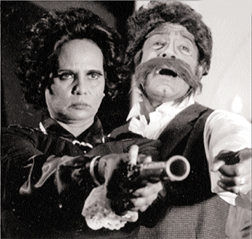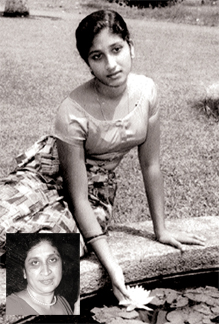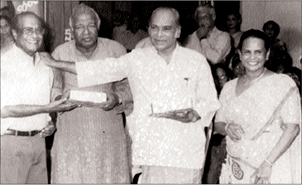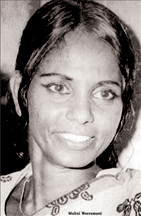|
observer |
|
|
|
|
|
OTHER LINKS |

|

|

|
'Actor is one who is made and not one who is born'Should be the motto of the Sinhala theatre Continued from last week
A Critique on the State Sinhalese Drama Festival of 1966 (This is a translation of a critique by Prof. Ariya Rajakaruna. He served as the Head of the Department of Sinhala of the University of Peradeniya. He is currently a visiting lecturer attached to the Departments of Fine Arts and Sinhalese. This is the only comprehensive review written on any State Sinhalese Drama Festival held during the last five decades. This review was first published in 1967. This critique has been translated for the first time.) It is not an exaggeration to state here that Sugathapala de Silva has presented a distorted picture of Sri Lankan society by implanting such characters in Sri Lankan society. The language that Silva used for the drama was also not poetical as the original language of the text. Though the language used by the urban middle class is appropriate for the drama, some sort of arrangement of that language should have been made when expressing complex experiences and emotions in the drama. It is on rare occasions only that language was set to express subtle zest but on other occasions, it has been used to arouse feelings. In some instances, the language used is far weaker than it is in usage. Silva requires many sentences to express an idea Williams expressed in a single sentence. There are some expressions in the text that have nothing to do with the prime zest of the drama and which have been used in order to arouse feelings. There are also some weaknesses on the part of actors and actresses. However, considering the nature of actors and actresses who enter the Sinhala theatre, portrayal of Wickrema Bogoda as husband and Prema Ganagoda as wife is commendable. But the principle weakness on the part of Bogoda is his inability to speak words loudly. Nevertheless, he has a talent in portraying 'dark characters. It should be stated that the best actress in the Sinhala theatre who could perform the character of A Cat on a Hot Tin Roof is Prema Ganagoda. On the other hand, she also has some weak features in her acting.
For instance, her acting in both Harima Badu Hayak and Hele Nagga Don Putta is almost identical. She used to express the same emotions and gestures irrespective of the type of character she portrayed on stage. Her ability to present facial expressions seems to be limited. In some instances she screamed at the pitch of her voice. At these particular instances, she completely lost her command over the character. It is obvious that she has not grasped the subtleties and complexities of the character she portrays. She seems to be developing herself as a person who portrays cheap characters. She is also talented in some other aspects. For, her acting is quite natural compared to may actresses on stage. She is also capable of delivering dialogues without conveying that she memorised them. The weaknesses born out of missing the lines which is frequent in the Sinhala theatre, has not been observed in her acting. Though Darmasiri Wickremeratne has the apt appearance for the character 'Big Daddy', he did not possess the aptitude to portray the character. Malini Weeramuni plays her character without any stage fright though she does not possess a fitting old-appearance to portray the character 'Ammandi', a character derived from 'Big uncle'. On some occurrences, she behaves in the manner of an 18 year old girl on stage. Williams' 'big uncle' is entirely different to the 'Ammandi' portrayed by Silva. 'Big Mama' is a fat and short woman and is about 60 years old and weighed 170 pounds! Malini is not exclusively apposite for the character 'Ammandi' which is derived from 'Big Mama's character. Either the costume designer Ralex Ranasinghe or the facial make-up artist could give her an old appearance. It is obvious that the producer has not given due consideration in selecting characters apt for roles in the drama. Namel Weeramuni, who portrayed the character of 'Aiyyandi', has also some weaknesses as an actor. Irrespective of the character, his facial expressions remain the same and words when pronounced seem to be intermingled, at some times, rendering them meaningless to the audience. Nawanandana Wijesinghe who was able to portray a comic character in 'Harima Badu Hayak', failed at portraying the character of a family doctor Engirisi Weda in Hele Nagga Don Putta. It seems clear that he can portray well the prototype of characters. Mano Siri Perera, who has a germane appearance to the theatre, shows no special aptitude in portraying 'Akkandi'. Ralex Ranasinghe and Sugathapala Motagedara's stage decorations, Ralex's costume design and Wijayasiriwardene Polonnovita's music did not contribute much to the intensification of the drama's zest. The song 'Ambalame Pina Pina' has apparently no links with the drama. The Birthday song has not been used to deepen the drama's zest. Lighting down of the stage, lighting up of the stage and other techniques employed to keep the audience' attention intact, has not seemed to be successful in 'Harima Badu Hayak'. However, compared to other dramas staged for the festival, it is not permissible to consider 'Hele Nagga Don Putta' as an unsuccessful production. Henry Jayasena's Ahas Maliga is an adaptation of Tennessee William's The Glass Menagerie (1945). "Veeduru Sathun Ranchuwa" is an expression that epitomises the essence of the drama, The Glass Menagerie which is full of ciphers. On the other hand, the title 'Ahas Maliga' is an attempt to over simplify the deep meanings of the play. Jayasena tried very hard to preserve the gist of the drama. However, in the first act, he failed to adapt the drama to fit well into Sri Lankan life. In terms of the text, stage decorations and some actors' and actresses' portrayals, the drama took a foreign outlook. However, the foreign outlook in the drama did not hinder it capturing the audience' attention. The reason for this is that it was presented in the form of an 'imaginary' drama. The narrator in the drama, at the very beginning, announces that he is acting in an 'unnatural' drama. Productionwise, 'Ahas Maliga' shows a higher degree of discipline which is not present in 'Hele Nagga Don Putta'. (To be continued.......) |












